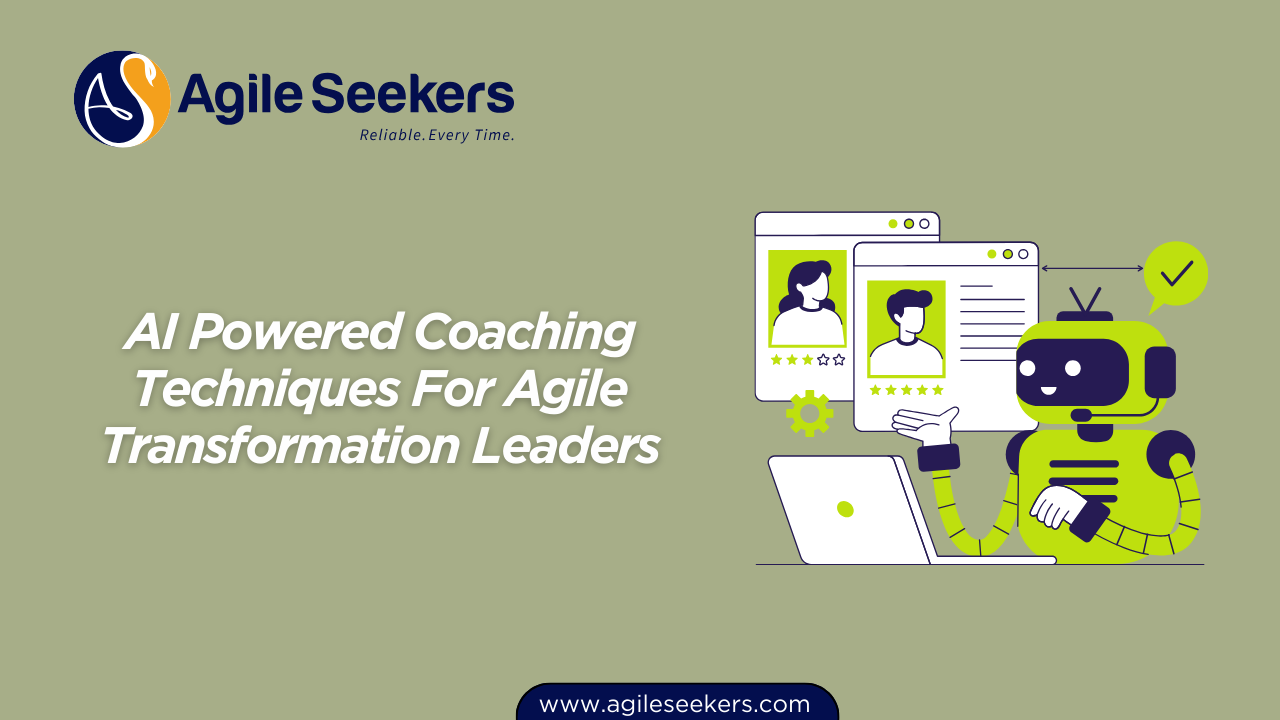AI Powered Coaching Techniques For Agile Transformation Leaders

Agile transformation isn’t just about adopting frameworks or running new ceremonies. It’s about shifting mindsets, building adaptive teams, and steering organizations toward continuous improvement. Coaching plays a central role in this shift—and AI is now giving transformation leaders a sharper edge in how they guide people through change.
Let’s break down the practical AI-powered coaching techniques that Agile Transformation Leaders can apply to create measurable impact.
1. Using AI to Personalize Coaching Plans
Traditional coaching often follows a standard template. AI changes this by analyzing patterns from performance data, feedback, and engagement levels to create personalized coaching roadmaps.
For example:
-
AI can review sprint velocity trends, backlog quality, and retrospective notes to pinpoint recurring bottlenecks for each team.
-
It can also identify individual skill gaps, suggesting tailored learning modules or mentoring sessions.
With a certification like AI for Agile Leaders and Change Agents, leaders can learn how to train AI models to segment teams based on maturity levels, so coaching feels targeted and relevant rather than generic.
2. Real-Time Feedback Loops with AI Tools
One of the challenges in Agile coaching is the delay between observation and feedback. AI-powered tools now allow near-instant analysis.
For example:
-
Natural language processing (NLP) can evaluate the tone and clarity of communication in sprint planning or daily standups.
-
AI sentiment analysis can spot when team morale is dipping before it turns into disengagement.
This helps leaders adjust coaching approaches immediately rather than waiting for the next retrospective.
External reference: Harvard Business Review has covered how AI-based feedback systems improve leadership coaching effectiveness.
3. AI-Assisted Retrospective Analysis
Retrospectives are rich with insights, but manually sifting through them can be time-consuming. AI can:
-
Cluster feedback into themes (e.g., process issues, tooling gaps, interpersonal challenges).
-
Identify patterns over time, such as a recurring drop in team confidence during release planning.
With this data, Agile Transformation Leaders can focus coaching conversations on root causes rather than symptoms.
4. Intelligent Goal Setting and Tracking
AI-powered OKR (Objectives and Key Results) tools can:
-
Suggest realistic yet challenging goals based on past performance.
-
Provide progress forecasts, so leaders can step in with support when teams fall behind.
Instead of relying solely on gut feel, AI gives transformation leaders evidence-backed insights to guide goal discussions.
5. AI for Conflict Resolution Coaching
Team conflict isn’t always bad—it can lead to innovation if managed well. AI can assist by:
-
Monitoring collaboration tools for indicators of friction, such as long response times, repetitive disagreements, or reduced participation.
-
Suggesting conversation reframing techniques or decision-making models based on the nature of the conflict.
This helps coaches intervene early and equip teams with healthier communication habits.
6. Scenario Simulation for Decision Coaching
AI-driven simulations allow leaders to run “what-if” scenarios:
-
What if a key team member is unavailable during a PI (Program Increment) planning?
-
How would changing sprint lengths impact delivery predictability?
By walking teams through simulated outcomes, leaders can coach them on decision-making under uncertainty—a key part of Agile maturity.
7. Leveraging AI in Leadership Self-Reflection
Coaching isn’t just for teams; transformation leaders need it too. AI can act as a mirror by:
-
Analyzing leaders’ own meeting contributions for dominance vs. facilitation balance.
-
Suggesting areas to improve clarity, inclusiveness, or decisiveness.
When leaders use AI to track their own behavior, it sets an example of continuous improvement for the entire organization.
8. Measuring Coaching Impact with AI
It’s often hard to quantify coaching results. AI analytics can link coaching interventions to measurable business outcomes, such as:
-
Reduction in cycle time after communication coaching.
-
Increase in sprint predictability after backlog refinement guidance.
With concrete metrics, leaders can fine-tune their approach and justify the investment in coaching programs.
9. AI as a Learning Partner for Continuous Growth
AI tools can recommend relevant resources—articles, videos, case studies—based on ongoing challenges teams face. For instance:
-
If a team struggles with prioritization, AI could surface advanced backlog management techniques.
-
If leaders face stakeholder resistance, AI could recommend negotiation strategies backed by real-world Agile adoption stories.
This transforms AI from a passive data processor into an active coaching partner.
10. Ethical Considerations in AI Coaching
AI in coaching must be handled responsibly:
-
Data privacy: Ensure team conversations and feedback are stored and processed securely.
-
Bias awareness: Regularly audit AI models to avoid reinforcing existing biases in decision-making.
-
Transparency: Teams should know how their data is being used for coaching purposes.
Ethical use not only builds trust but also ensures AI enhances, rather than replaces, human connection.
Final Thoughts
AI is not replacing Agile coaches—it’s giving them sharper tools. The best Agile Transformation Leaders will blend human empathy with AI-powered insights, creating a coaching experience that’s adaptive, data-driven, and deeply personal.
If you want to master these techniques and apply them effectively in transformation programs, AI for Agile Leaders and Change Agents Certification covers both the technology and the human side of AI-driven change leadership.
AI-powered coaching isn’t a future concept—it’s already here. The leaders who learn to harness it will accelerate Agile transformations, build more resilient teams, and drive measurable business value.
Also read - Using AI To Drive Continuous Improvement Across Agile Teams
Also see - How To Use Prompt Libraries For Faster Agile Decision Making




















